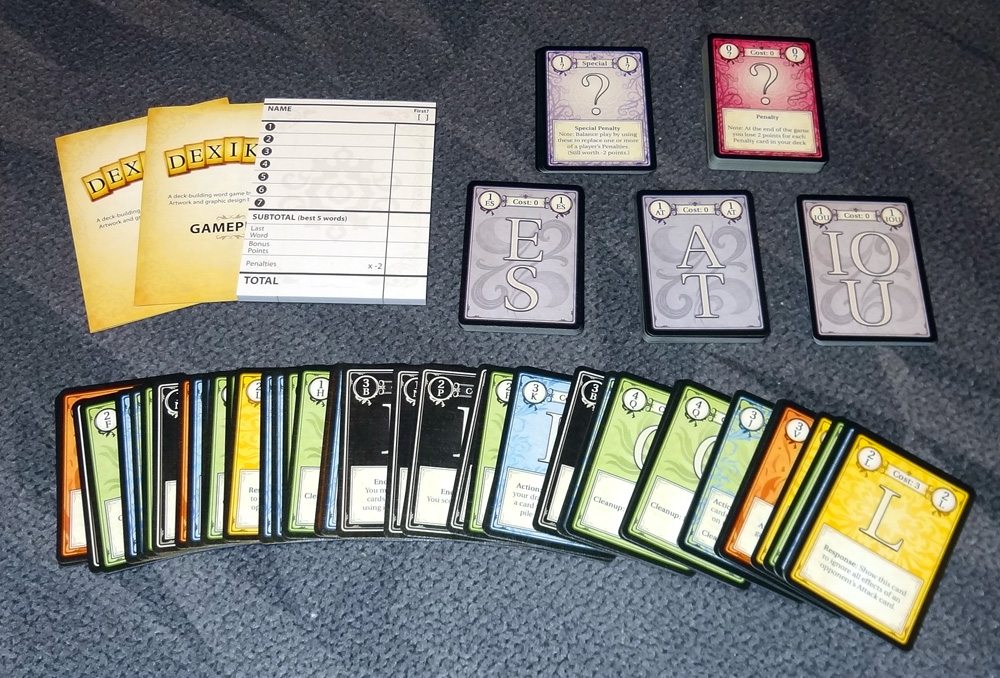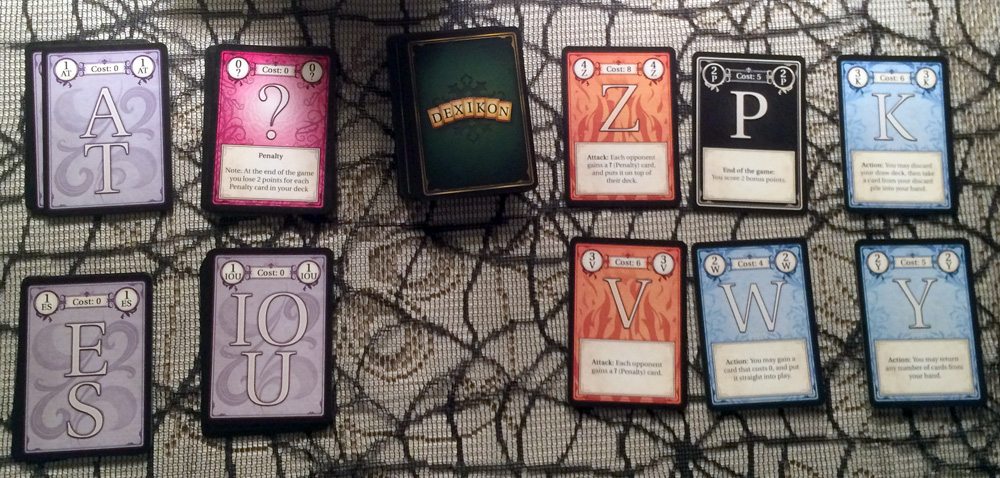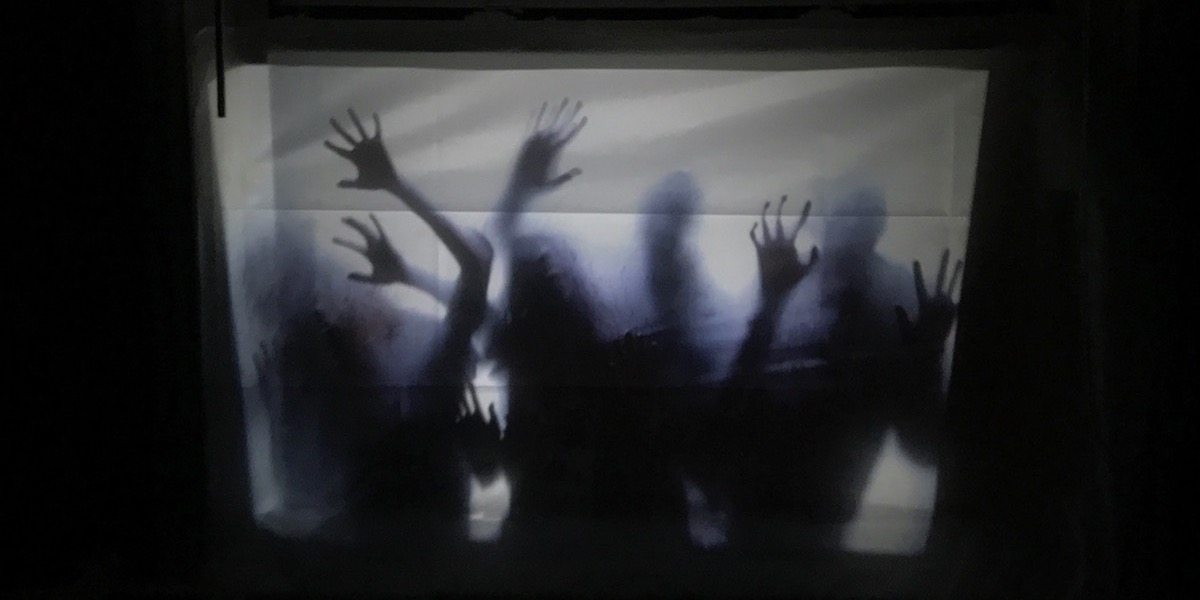Dexikon
At a glance: Dexikon is for 1 to 5 players, ages 8 and up, and takes about 45 minutes to play. It retails for $14.99 and is available online and in game stores now.

Components:
- 1 score pad
- 71 Core cards:
- 13 A-T cards
- 13 E-S cards
- 13 I-O-U cards
- 27 Penalty cards
- 5 Special Penalty cards
- 53 Pool cards (2 or 3 copies of each of the other 19 letters of the alphabet)
The cards are a linen finish and they have a nice snap to them, but I did find that they stick together a little bit, making them harder to fan out in your hand. The cards are easily legible, with just large letters printed on the face of the card, a cost at the top, and then a point value and the letters again at both of the top corners. I like the fact that the cards allow for right- or left-handed players that way. The background color varies depending on the type of the card–action, attack, response, and so on. Overall, the cards aren’t especially exciting.
The one tricky thing about the cards is that, on the cards with multiple letters, the letters are printed right next to each other on the index. So when you fan your cards, it’s hard to see “AT” and think of it as “A” or “T” rather than just “at.” It might have been easier to parse if the letters were shown stacked vertically.
The whole thing comes in a small box, like the rest of the EGG series from Eagle-Gryphon Games, which makes it quite portable.

How to Play
You can download the PDFs of the setup and gameplay here. There’s even a print-and-play available if you want to try it for yourself–though of course printing and cutting over a hundred cards takes a good deal of time.
The goal of the game is to score the most points by banking words that you spell.
Setup is pretty simple: The Core cards and the dark pink Penalty cards (showing a “?”) are put in the center of the table in four separate stacks. The Pool cards are all shuffled together, and six cards are dealt face-up to the table. Finally, the Pool deck is placed on the table, with room for a discard pile.
Each player starts with 10 cards: 2 each of the core letter cards, and 4 Penalty cards. (The purple Special Penalty cards can be substituted for younger players, since they give the player stronger abilities.) Everyone shuffles their own starting cards to form a deck, and then draws six cards for their starting hands. Each player gets a score sheet. Mark the checkbox on the first player’s score sheet so you know who started the game.
Each turn has six phases:
- Play cards
- Declare word
- Resolve Attacks
- Refresh the pool
- Use points and buy cards
- Cleanup

Play cards: play any number of the cards in your hand onto the table. Action cards (Blue) have effects that you may resolve.
Declare word: Arrange letters to spell a word. Cards with multiple letters on them (like the Core cards) can be used for any one of the letters. Penalty “?” cards are wild letters. Any cards that can’t be used in a word go back into your hand.
Resolve Attacks: Orange Attack cards are only resolved if you use them in a word, and are resolved from left to right in your word.
Refresh the pool: If you wish, you may discard the entire pool and refill the six pool cards from the deck.
Use points and buy cards: Add up the point values of the cards in your word. If you have no cards left in your hand, add 1 bonus point. Then you must Spend or Bank your points. If you spend, use the full point value to buy any number of cards from the pool. If you Bank your points, write your word on your score sheet along with the score, and then you get to spend half the point value (rounded down) to buy cards. You may only buy 1 card from the Core area (they cost 0), and you must buy at least one card total. Once you Bank a word, nobody else is allowed to spell that word during this game.
Cleanup: Resolve any green Cleanup cards. Discard all cards you played, bought, and anything left in your hand, and then draw six new cards. If there are fewer than six cards in the pool, refill from the deck.
The game ends at the end of the round when any player banks their seventh word. Then, all players get a chance to make a “last word.” Look through all of your cards–your deck, hand, and discard–and spell any word you like. Card abilities are not used in the last word just point value. Record your last word and score on your score sheet. Finally, resolve any black “End of Game” effects in your deck.
For your final score, add the five highest words you Banked, plus your last word and bonus points. Finally, subtract two points for each Penalty card in your deck. Highest score wins, and ties go to the player with the highest value word.
There’s a set of rules for solitaire, which involves shuffling some Penalties into the pool deck and then having to resolve them, either by gaining them into your own hand or using the L (Response) card and Attacks to move them into a scoring stack.

The Verdict
Dexikon has an interesting approach to scoring, with the choice between spending your points or banking your word. If you make a low-scoring word, in most cases you’ll just spend it, getting better letters (and abilities) into your deck in order to improve your point values later. But if you have a high-scoring word, you have a tough decision: either you can buy more letters and improve your deck significantly in a single turn, or you can bank the points for a permanent score.
I like when there’s a tension between immediate gains and the ultimate goal of the game. You can’t win if you don’t bank anything, but you won’t be able to bank much if you don’t buy some better cards. On the other hand, if you start banking small words right away, you may be able to end the game before everyone else has had a chance to bank much–but it’s a gamble because of that “last word” and the fact that only five of your seven banked words will count.
There’s a pretty good mix of abilities: some cards let you get rid of cards in your hand, which can help you get rid of penalties and score that bonus point for using all your cards. Attack cards generally force other players to take penalty cards. The Response cards are like the Moat in Dominion: you reveal it from your hand to ignore an attack. However, I think there are only two Response cards in the entire deck, which makes them quite valuable and hard to get. Cleanup cards generally let you draw extra cards for the next turn. Finally, end-game cards can award you bonus points or even let you return some penalty cards so they don’t count against you. What may be a little confusing at first is that you can play a card for its ability even if you can’t use it in a word–but it will go back into your hand so you don’t get the 1-point bonus for using all your cards.
The downside to the game is that at the beginning it can feel a little like grinding before you get anywhere. Everyone has those basic cards, and it’ll take you a couple turns before you’re spelling anything that seems worth banking for points. Also, if nobody banks any words (because everyone’s holding out for a higher score), the game can drag on a bit. However, once the first player banks a word, things tend to escalate quickly, which reminds me a little of the end-game in Dominion: everyone’s building their decks, but as soon as somebody buys a victory point card, you see everyone follow suit.
Because of the “return” powers, there are a lot of ways to weed your deck and get rid of cards you don’t want–but generally you’ll be spending those on the penalty cards. Since vowels are only available on the core cards, it’s not a game where you try to get rid of all your starting cards, even though they have no special abilities, because otherwise you can’t spell anything at all. It really is important to have a balanced deck, or else you can sometimes get stuck with an entire hand of consonants.
Overall, Dexikon is a fine mash-up of Scrabble and Dominion, and the small box makes it great for travel.






Paperback is a favorite of my wife and I, we backed it on Kickstarter. I’m a lousy speller but really enjoy the game.
Have been looking at both but favoring Paperback myself. Thanks for the review and the comparison.